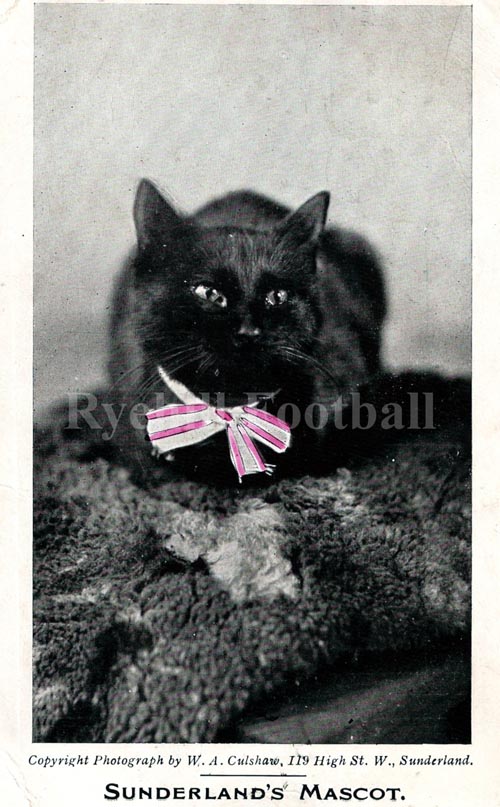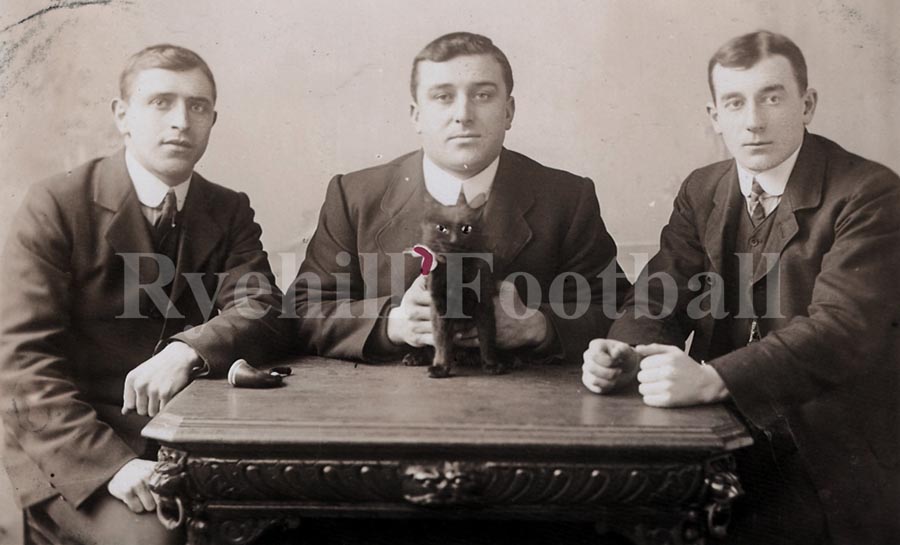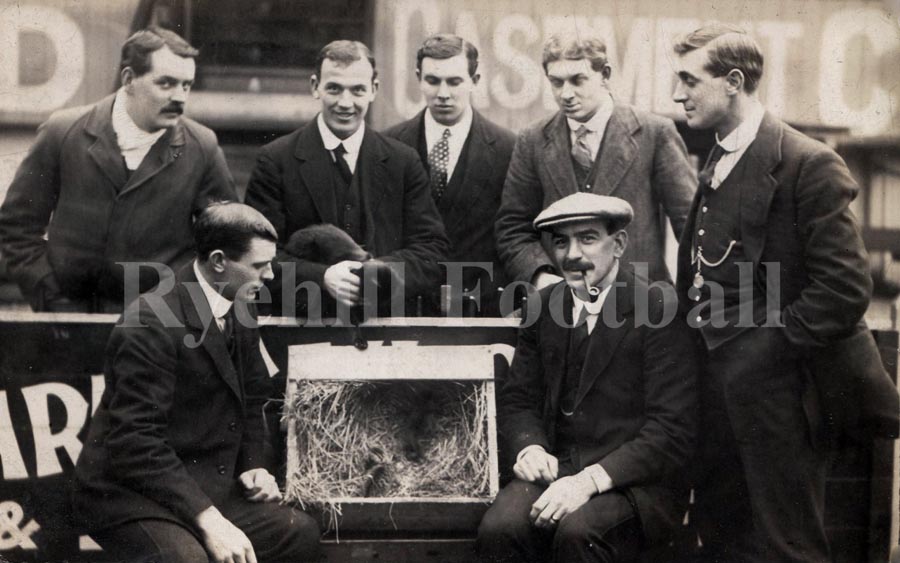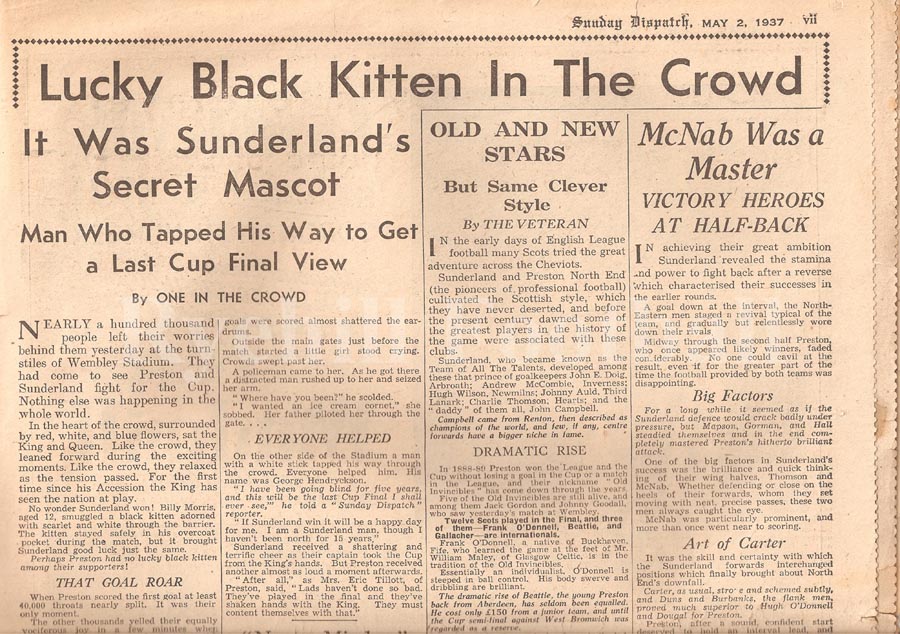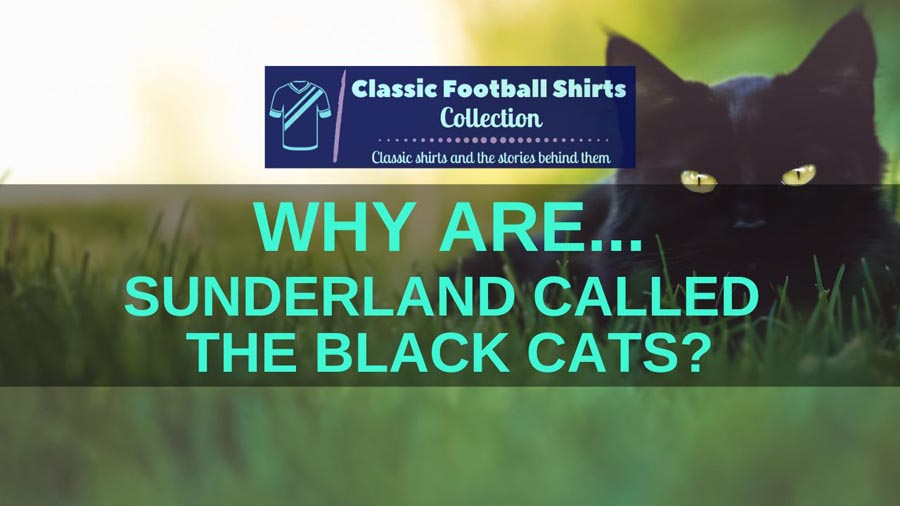
It seems a somewhat unusual nickname, there is no play on words of the club’s name and no obvious reference to club colours or heritage.
So why are Sunderland called the Black Cats?
Although the nickname is officially fairly new, its origins go back a long time…
So let’s take a closer look at them.
Why Are Sunderland Called The Black Cats?
There are two theories behind Sunderland’s nickname of the Black Cats. The official version from the club is that it is after the Black Cat Gun Battery in the city, named after a mysterious black cat in 1805. The second theory is that it is after a lucky black cat found in the team’s dressing room in 1909 that was said to be responsible for turning the club’s fortunes around at the time.

The Rokermen Are No More…
In 1997 Sunderland moved from Roker Park, their home of 99 years, to the new Stadium of Light.
That meant that their previous nickname, the Rokermen or Rokerites, was redundant.
In fact for three years, from 1997 to 2000, the club didn’t have an official nickname.
Seeking to rectify this, in 2000 the club ran a vote for a new nickname through its official magazine, the Legion of Light, and its website.
There were five options:
- The Black Cats
- The Mackems
- The SoLs
- The Miners
- The Light Brigade
The results were fairly unanimous, the Black Cats won 48% of the 10,000 votes, with the Mackems in second with 37% of votes.
A new logo featuring a slightly menacing black cat was created and a new nickname was officially born.
Theory #1: The Black Cat Battery
Of course, there was plenty of interest in the origins of the nickname.
What did black cats have to do with Sunderland?
The club gave its official take on the matter and said that in 1805 a gun battery on the River Wear was renamed the ‘Black Cat Battery’, after the men manning the station reportedly heard the mysterious howling of a black cat.
The name apparently became so synonymous with the city that in 1905, when the club got its first official crest, the most prominent feature was a black cat.
And the connections were strong enough that in 2000, almost two centuries after the men heard the unusual cries of the black cat, it was voted by fans as Sunderland’s official nickname.
Theory #2: The Lucky Black Cat
However there is a second explanation as to the role the black cat plays in the history of the Sunderland Football Club, and it is equally plausible.
After being formed in 1879, Sunderland wasted little time in becoming one of the best, if not the best, clubs in the country.
For the first decade, the club played in regional leagues before joining the Football League in the 1890/91 season.
In 1891/92, only their second season in the Football League, Sunderland won the title. The following season they were runners-up before winning the league for a second time the season after.
They won a third league title in 1901/02 and in a six-season spell between 1897 and 1903, they finished in the top 3 five times.
In short, they were universally recognised as one of the great teams of that era.
RELATED ===> Revealed: The Best Retro Sunderland Shirts
The Lucky Black Cat of 1909
Images courtesy of ryehillfootball.co.uk. Click to enlarge
By the start of 1909 however, the club was going through a very lean spell by their standards.
They hadn’t won the league in seven years and had not finished higher than 10th in their previous three seasons.
A 4-1 home defeat to Liverpool on New Year’s Day 1909 left the club struggling dangerously near the bottom of the league.
When the players came into the dressing room the next day ahead of their fixture against Bury they found a stray black cat had taken residence there.
Sunderland won 3-1, and news of this ‘lucky’ black cat began to spread.
RELATED ===> Why Are Norwich Called The Canaries?
The following week Sunderland went to Sheffield United and won 2-0.
Then on 16 January, they travelled to Sheffield United again for an FA Cup tie. Despite starting the second half 2-0 down Sunderland came back to win 3-2.
A week later Sunderland were back at Roker Park, beating Aston Villa 4-3.
Four games since the black cat had made itself at home in the Sunderland dressing room, and four wins.
By this point the feline mascot had been officially adopted by the players, and at the end of January 1909 even the Sunderland Echo said of the cat “there has been a big demand for its portrait, more having been disposed of than of all the players put together”.
That year thousands of Sunderland fans travelled to Newcastle for the FA Cup Quarter-Final, with black cat mascots adorned with red and white ribbons.
The link between Sunderland and the lucky black cat has endured ever since.
In 1913 Sunderland reached their first-ever FA Cup Final and again thousands of fans travelled to Crystal Palace for the Final wearing badges and pictures of black cats. The cat was also featured on much souvenir literature for the Final.
Plenty of photos from this time also show players with the lucky black cat.
Billy Morris and His Kitten
We are left in little doubt of the importance of the cat in the early years of Sunderland by a news story printed in the Sunday Dispatch on 2 May 1937 following Sunderland’s first-ever FA Cup win, a 3-1 victory over Preston.
The Dispatch, a prominent British newspaper of the time, tells how 12-year-old Billy Morris smuggled a black kitten into the Final in his overcoat.
What is most amazing about this story is how he managed to get all the way down to London from Sunderland with a cat in his pocket, and then watch a game with almost 100,000 other spectators, without the cat making a run for it at some point!
There are also stories out there of a black cat making Roker Park its home in the 1960s, and the club informally adopting it by leaving food and water out for it.
Either way, it is fair to say there is plenty of documented evidence to suggest black cats have had a strong link with Sunderland from very early on in their history.
RELATED ===> Why Are Watford Called The Hornets?
So What is the Real Reason Sunderland Are Called the Black Cats?
So is the club’s official story of the Black Cat Gun Battery true?
Or are Sunderland called the Black Cats because of the lucky black cat that strolled into their dressing room in 1909 and turned their fortunes around?
It is difficult to say for definite, although the late club historian Dave Hillam feels some artistic license was used by the club for its official interpretation.
Dave, who sadly passed away unexpectedly in 2008, ran a website devoted to the history of Sunderland.
On the site, which has long since ceased to exist, Dave thought the Black Cat Battery story was slightly dubious for the following reasons:
- If the black cat was mysterious and only heard, how did those who heard it know it was black?
- The Black Cat Battery had never previously been mentioned by the club until around the time it ran its poll to find a new nickname.
- In the reports about the lucky black cat in the local papers from 1909, there is no reference to the gun battery. A mention would have been expected if the story was known locally then.
The debate isn’t over whether the Black Cat Gun Battery existed, as it is known that it did, it was more over the fact that in 2000 when the club started quoting the story as the reason for the nickname, no supporters had heard of it before and it had never previously been mentioned by the club before.
So it could be that it was a coincidence that the Black Cat Gun Battery had existed.
However if that is the case it was a convenient coincidence for the club who used it to justify the new nickname.
So is the real reason for the black cats nickname down to the lucky black cat of 1909?
Quite possibly, however the only sticking point here is the fact that the club’s first official crest in 1905 already featured a black cat!
And also the official Sunderland club site says that “in 1905, a black cat was pictured sitting on a football next to Chairman FW Taylor”…
Final Thoughts
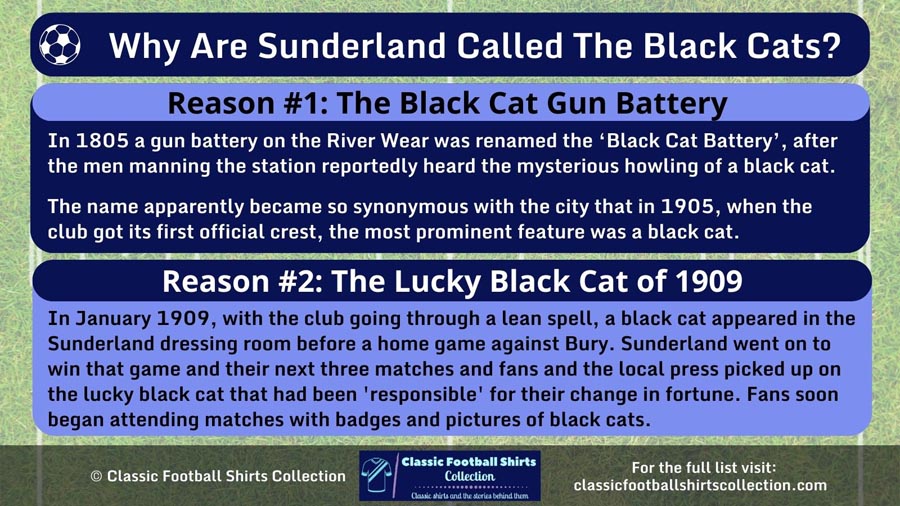
It is difficult to say with 100% certainty why Sunderland adopted the nickname the Black Cats, or more precisely why there was a strong enough reason for almost 5,000 Sunderland fans to vote for it as the club’s official nickname in 2000.
Undoubtedly black cats and Sunderland have a long history, shown by the inclusion of a black cat on the first club badge in 1905.
Was it down to the Black Cat Gun Battery? If it was, it is something that is not evidenced in any press coverage prior to the period when Sunderland were voting on the new nickname.
Surely it would have been noted somewhere in historical press cuttings in the 20th century? But it wasn’t.
The story of the black cat in 1909 has been referenced in the Sunderland Echo at the same time, so we know there is a link there.
Then we have evidence of thousands of Sunderland fans travelling to the FA Cup Quarter-Final the same year with black cat paraphernalia.
We will probably never know the real truth behind it, although if you have your own theories please drop them in the comments box below.

